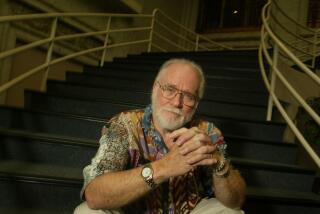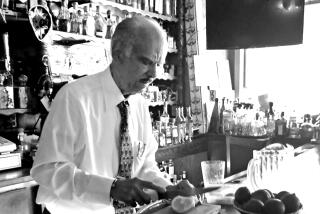PASSINGS: James McLure, Joseph Flom, Harry Fogle, Tommy Bell, John Robinson
James McLure
Playwright who wrote ‘Lone Star’
James McLure, 59, a playwright and actor best known for his two one-act plays that reached Broadway, died Feb. 17 from cancer at his home in Marina del Rey, said his sister, Jenny Schroeder.
McLure’s plays “Lone Star,” set behind a small-town Texas bar, and “Pvt. Wars,” the story of three young Vietnam veterans in a hospital, were produced on Broadway in 1979.
“I’m part of the Vietnam generation,” McLure told the Columbus (Ohio) Dispatch in 1994. “My plays are a combination of autobiography and people I’ve known.”
In a 1984 Times review of an expanded version of “Pvt. Wars” at the Zephyr Theatre in West Hollywood, critic Lawrence Christon noted McLure’s “extraordinary delicacy … to suggest how irreparably these men have been wounded, and not altogether physically.”
James Miller McLure Jr. was born Aug. 5, 1951, in Alexandria, La., the second of three children of Mary and James McLure. He grew up in Shreveport, La., and graduated from Southern Methodist University in Dallas, where he started writing “Lone Star” for use in an acting class.
McLure’s other plays included “Laundry and Bourbon” and “The Day They Shot John Lennon.” His “Wild Oats,” a Wild West adaptation of an 18th century farce by John O’Keefe, was performed at the Mark Taper Forum in 1984.
Joseph Flom
Expert in corporate takeovers
Joseph Flom, 87, a corporate lawyer and architect of the modern mergers-and-acquisitions business, died Wednesday, according to an announcement by his New York-based firm, Skadden, Arps, Slate, Meagher & Flom. The cause was heart failure.
Flom was “a giant in the takeover field, perhaps the single most important force in the game during the 1970s and 1980s,” Robert Slater wrote in his 1999 book, “The Titans of Takeover.”
So feared was he “that arbitragers were eager to know which side Joe Flom was on whenever a takeover was announced,” Slater wrote. Some firms even paid him a retainer to make sure he wouldn’t end up challenging them, a practice that became known as the “Joe Flom protection policy.”
Flom helped orchestrate Ron Perelman’s 1985 takeover of Revlon and ABC’s sale to Capital Cities. In 2005, he advised May Department Stores Co. in its $11-billion merger with Federated Department Stores Inc. Three years later, Flom advised Anheuser-Busch Cos. when it was bought for $52 billion by the Belgian brewer InBev NV.
Flom, along with Martin Lipton of Wachtell Lipton Rosen & Katz, pioneered legal maneuvers in hostile takeovers in the 1980s. Lipton typically worked defense and Flom often worked offense.
Joseph Harold Flom was born on Dec. 21, 1923, in Baltimore, the son of a union organizer and a housewife from Russia. He was raised in Brooklyn and attended City College of New York before enlisting in the U.S. Army.
Flom never completed his undergraduate studies. He was accepted at Harvard Law School, which he attended under the G.I. Bill, and served as editor of the Law Review before graduating in 1948 and joining Skadden Arps as its first associate. He specialized in mergers and proxy contests when few major law firms did.
Harry Fogle
Last surviving worker on Bay Area bridges
Harry Fogle, 97, believed to be the last surviving worker who helped build the San Francisco-Oakland Bay Bridge and the Golden Gate Bridge, died Feb. 10 at a hospital in Roseville, Calif. He had congestive heart failure, according to the Sacramento Bee.
Fogle was born in 1913 on a Wisconsin dairy farm and moved to California in 1935 when he got a job on the Bay Bridge painting the towers and supporting cables. He was paid $11 a day to work hundreds of feet above the bay with no safety net.
“I felt I was lucky to have a job,” he said of the Depression-era job in an interview with the San Francisco Chronicle last year.
Fogle left in 1936 to join the Golden Gate project, which he believed was safer because a net was used. He was on the job Feb. 17, 1937, when 10 men were killed when a section of scaffolding carrying them fell through the net. Undaunted, he painted the bridge towers in frigid temperatures and gusty winds that battered him 750 feet above sea level.
“He said it was very windy and very cold,” said his wife of nearly 62 years, Marie. “But on a beautiful day, he said, you couldn’t beat it.”
After the Golden Gate Bridge was completed in May 1937, Fogle stayed for almost 40 years with the crew painting the bridge year-round. He left briefly to paint houses and another time to work on the Carquinez Bridge project, but he returned to the Golden Gate and later was promoted to crew boss.
He retired in 1976. Golden Gate Bridge district spokeswoman Mary Curie told the Chronicle that Fogle apparently was the last surviving worker of both bridges.
Tommy Bell
Retired Air Force brigadier general
Tommy Bell, 80, a retired Air Force brigadier general whose long career included serving as an experimental test pilot and flying combat missions during the Vietnam War, died Feb. 14 of a pulmonary embolism at Providence Little Company of Mary Medical Center in Torrance, said his daughter, Carolyn Phillips.
Bell flew more than 200 combat missions in Vietnam from November 1966 to September 1967.
He was promoted to brigadier general in 1977.
Bell was born Dec. 4, 1930, in Jacksonville, Texas, and enlisted in the Air Force in 1952 as an aviation cadet. After attending test pilot school at Edwards Air Force Base in 1959, he was assigned to Wright-Patterson Air Force Base in Ohio as an experimental test pilot and astronaut candidate, his daughter said. He returned to Edwards in 1963 as an instructor.
He graduated with a bachelor’s degree in aeronautical engineering from what is now called the University of Illinois at Urbana-Champaign in 1959, and earned a master’s in mechanical engineering from USC in 1966 and a master’s in management from George Washington University in 1972. He also graduated from the Industrial College of the Armed Forces in Washington, D.C., in 1972.
Bell’s honors included a Bronze Star Medal, Distinguished Flying Cross and NASA’s Distinguished Service Medal. After retiring from the Air Force in 1980, he worked for Northrop Grumman Corp. on the B-2 stealth bomber, his daughter said.
John Robinson
Scientist helped fight oil spills
John Robinson, 72, an environmental scientist who helped lead the scientific responses to many of the world’s biggest oil spills, died Feb. 13 of cancer at Santa Barbara Cottage Hospital, said his wife, Francesca Cava.
Robinson was chief of the National Oceanic and Atmospheric Administration’s hazardous response team, which provides scientific support to agencies such as the Coast Guard, Cava said. He was involved in the study and cleanup of an oil spill in the Gulf of Mexico in 1979, the oil tanker Exxon Valdez spill in 1989 and oil fires in Kuwait in the early 1990s.
Robinson was born Oct. 26, 1938, in Spokane, Wash., and graduated from high school in Texas. He graduated from Texas Tech University with a bachelor’s degree in industrial engineering.
After a short time working as a civilian with the Air Force in Texas, Robinson was hired by NASA and worked on the Mission Control team during Apollo missions to the moon. He joined the National Oceanic and Atmospheric Administration in 1971.
After retiring in 1994, he moved to Santa Barbara and joined the board of Heal the Ocean, a nonprofit group seeking to end ocean pollution.
—Los Angeles Times staff and wire reports
More to Read
Start your day right
Sign up for Essential California for the L.A. Times biggest news, features and recommendations in your inbox six days a week.
You may occasionally receive promotional content from the Los Angeles Times.






